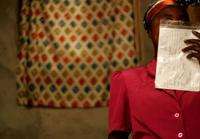Women, men, and children victimized by another instance of mass rape.
MSF provided specialized care to 53 women, men, and children who were raped between January 19 and 21 in South Kivu Province.
South Kivu, Democratic Republic of Congo/New York, January 28, 2011 – The international medical humanitarian organization Doctors Without Borders/Médecins Sans Frontières (MSF) has provided specialized care to 53 women, men, and children who were raped in a series of incidents that occurred between January 19 and 21 in South Kivu Province in the east of the Democratic Republic of Congo (DRC).
Most of the rape survivors MSF treated yesterday said they were ambushed on January 19 around the village of Nakatete, as they returned from market. They told MSF they had been held hostage throughout the day, raped multiple times, and subjected to further degrading treatment. Patients ranged in age from 13 to 60. Women and girls had been separated from men and their clothes and belongings were stolen.
Eleven women treated by MSF yesterday said they were ambushed on January 20 in the village of Kitumba while on their way back from a market, and were robbed and raped by a group of armed men. MSF also treated two women and a man who were similarly attacked in the same location the next day.
These new incidents of large scale rape come a few weeks after a mass rape on New Year’s Day in the Fizi region of South Kivu.
“In the space of a few weeks alone, MSF has provided medical treatment for nearly 100 women, men, and children—all of whom have been raped in mass attacks,” said Annemarie Loof, MSF head of mission in South Kivu. “We are extremely concerned about the fate of civilians in this area—normal people who have nothing to do with the conflict and who bear the brunt of a recent increase in violence and insecurity in this part of eastern DRC.”
For years, civilians in eastern DRC have suffered sexual violence related to ongoing conflict. But MSF has not provided medical treatment for rape on this scale in South Kivu since 2004. In an already volatile context, MSF is witnessing a further deterioration of the situation, which is directly impacting the civilian population.
MSF has provided medical care to the people attacked, treating wounds and providing preventative treatment for possible sexually transmitted infections. The survivors were also vaccinated against Hepatitis B and tetanus. Girls and women examined in time were offered morning-after pills to prevent unwanted pregnancies.
In South Kivu, MSF provides emergency health care to a population suffering from violence, sexual violence, displacement, malaria, malnutrition, and disease outbreaks such as cholera and measles. In 2010, MSF medical teams in the Fizi region treated 20,000 malaria patients, gave 65,000 medical consultations, cared for 10,000 inpatients at Baraka hospital and helped to deliver 4,000 babies.
Throughout the Kivus, MSF runs hospitals, mobile clinics, health centers, vaccination campaigns and cholera programs, and provides treatment and psychosocial care to survivors of sexual violence. In 2009 alone, MSF provided medical and psychosocial care for 5,600 rape victims in North and South Kivu.




